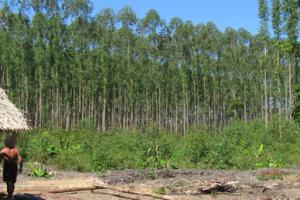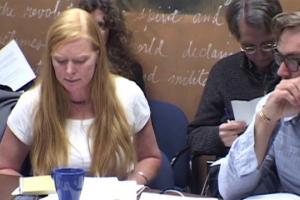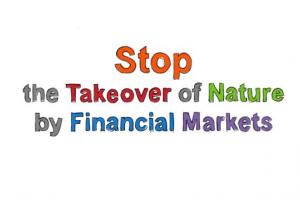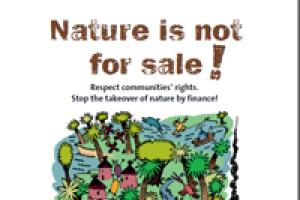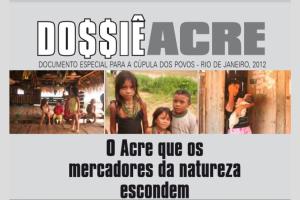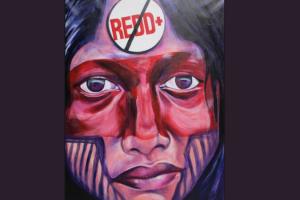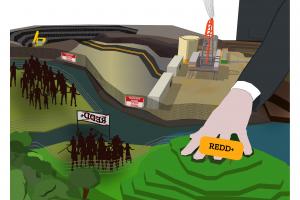September 21, the International Day Against Monoculture Tree Plantations, is a day for our organizations, networks and movements to celebrateresistance and raise our voices to demand, Stop the Expansion of Monoculture Tree Plantations! which threaten the sovereignty of our peoples.
The Green Economy
The Green Economy is a tactic used to “clean up” the image of corporations rather than address corporate capture and capitalism as the true drivers of deforestation. False solutions promoted under the Green Economy include certification, sustainable forest management, ecosystem services, REDD+, the bioeconomy, nature-based climate solutions, and zero net deforestation. Rather than stopping it, these “solutions” support corporate-driven destruction that is causing a deep social and ecological crisis.
Bulletin articles
30 August 2012
Finan-what?
The term “financialization” may sound overly complex and academic, or perhaps even made up. It could lead some people to ask, finan-what? However, it is increasingly being used in civil society debates and reflections, particularly with regard to the growing financial speculation tied to the goods and components of nature, including forests, which are of fundamental importance not only for the lives of local communities, but for the entire planet.
Other information
30 August 2012
A short animated film about the takeover of nature by financial markets and the real alternatives coming up from civil society. An initiative of SOMO, European ATTAC Network, Food & Water Europe, Friends of the Earth, Carbon Trade Watch, WEED, Ecologistas en Acción, AITEC and Campagna per la riforma della Banca Mondiale.
Available at
Other information
30 August 2012
This new report published by Rainforest Foundation Norway and Friends of the Earth Norway documents the political incoherence of the Norwegian government, which spends an annual 500 million US dollars and huge political capital on rainforest protection while investing some 13.7 billion dollars in industries destroying it.
Available at http://www.regnskog.no/languages/english/_attachment/29989?_ts=13660256314
Other information
30 August 2012
An article that analyzes the law passed in the Brazilian state of Acre in 2010 to create the State System of Incentives for Environmental Services (SISA). The law is considered a model and example for the world; however, it ultimately serves to turn over the state’s natural wealth, including its forests, to the financial speculation market.
Other information
30 August 2012
A leaflet on the Green Economy and the financialization of nature, published by Friends of the Earth France, ATTAC and AITEC.
Available at http://www.amisdelaterre.org/IMG/pdf/nature_is_not_for_sale.pdf
Bulletin articles
30 July 2012
Those who were in Rio de Janeiro between June 15 and 23 were able to observe three parallel and different but interconnected processes. The first process, a closed one, was the Conference on Sustainable Development better known as Rio+20, which took place in Riocentro, a conference centre far from the city centre and heavily protected by thousands of police officers and armed forces.
Other information
30 July 2012
Rather than shifting course, the so-called Green Economy strategy unveiled at the 2012 United Nations Conference on Sustainable Development drives nature further into the global marketplace by defining an economic value on what the Earth “does” for humans, detachedly called “ecosystem services.” Proponents of this scheme of “commoditizing” soil, forests, and fresh water profess that by putting a price on the natural world, it can be ‘saved’.
Other information
30 July 2012
The goal of the private investment firm Terra Global Capital is “to facilitate the market for land use carbon and other environmental credits (…) by providing technical expertise for the measurement and monetization of land use carbon credits and carbon finance through a dedicated investment fund.”
Other information
30 July 2012
The REDD (Reducing Emissions from Deforestation and Forest Degradation) mechanism and its subsequent expanded version, REDD+, which encompasses monoculture tree plantations, form part of the “market-based” strategies for confronting climate change that we consider to be false solutions, since they do not address the true causes of the problem. The basic concept behind REDD is that governments, or the owners or concession-holders (companies, big NGOs) of forests in the South, should be compensated for keeping the forests standing, instead of cutting the trees down.
Bulletin articles
29 June 2012
This edition of the WRM bulletin is being released as the Rio+20 People’s Summit is beginning in Rio de Janeiro, Brazil. In May, during a meeting of the International Coordination Group of the People’s Summit (*) – of which WRM forms part –an international call was launched. We would like to share with all of our bulletin readers this message for the unity and mobilization of the peoples in defence of life and the commons, for social and environmental justice, and against the commodification of nature and the “green economy”:
Other information
29 June 2012
Movements and organizations from Asia have made a declaration rejecting the “Green Economy” being proposed by global institutions and now the subject of debate in the Rio+20 process, for several reasons including:
